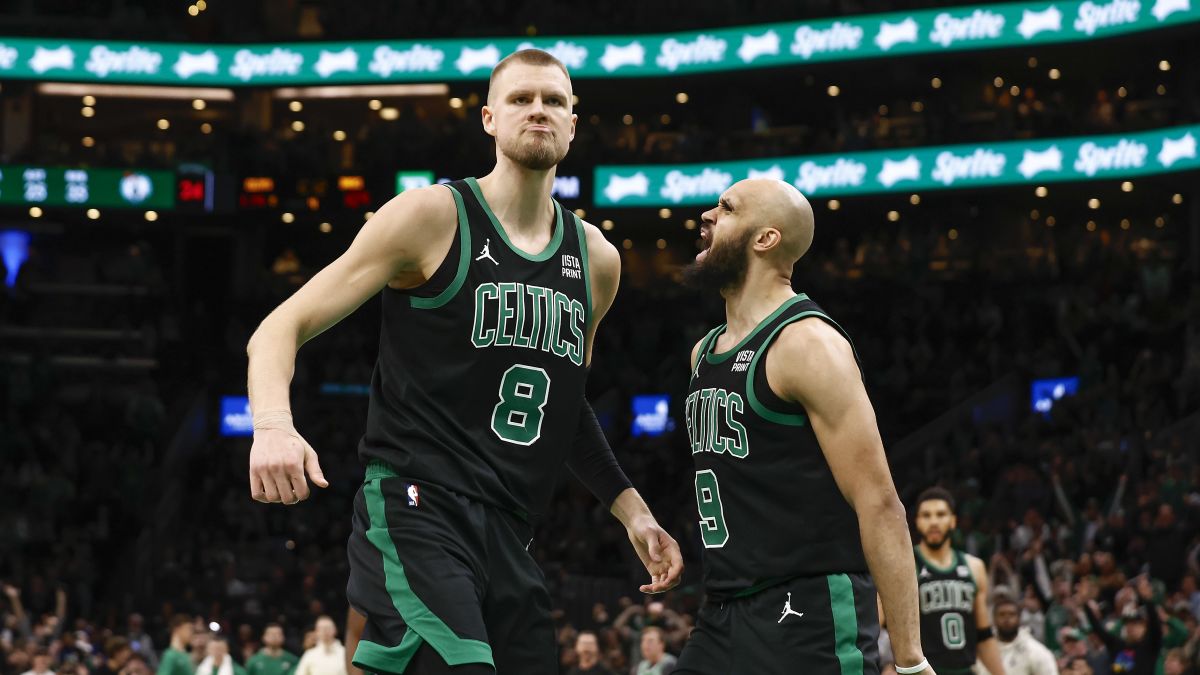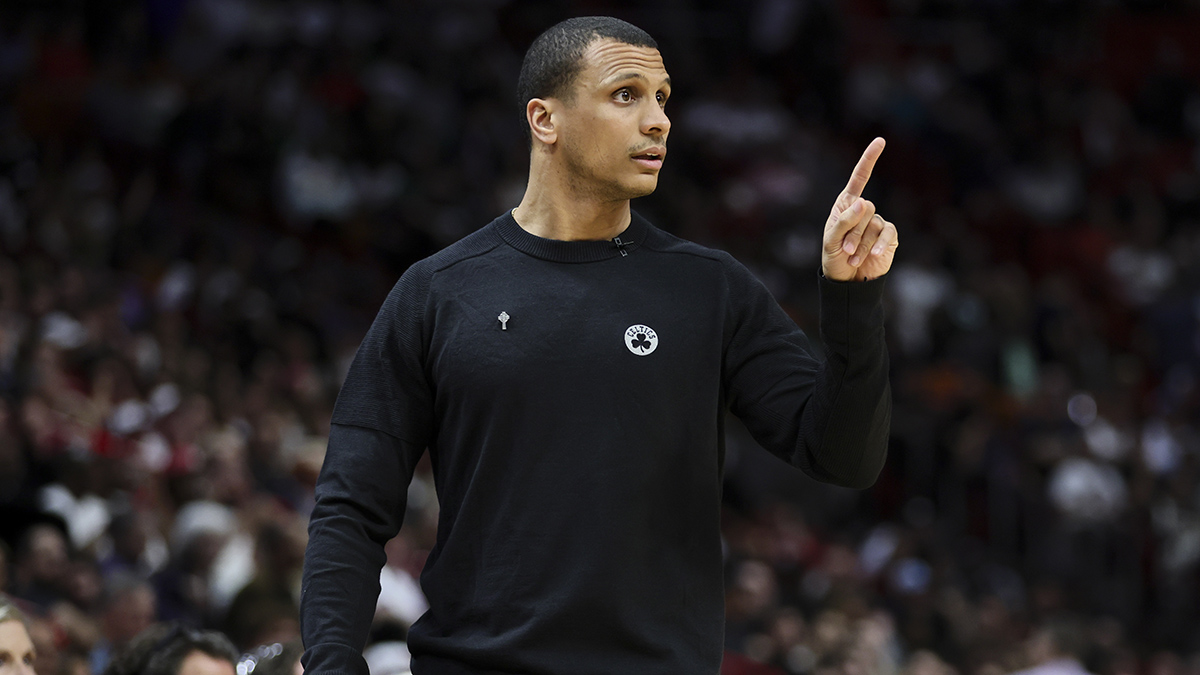
As you well know by now, the Cavaliers completed their sweep of the Celtics on Sunday afternoon, but not without picking up a few nasty splinters. In the end, Cleveland lost Kevin Love for (most likely) the rest of the playoffs. They lost JR Smith for the next two games. The series wasn’t a total catastrophe for LeBron, but it was kind of like celebrating a birthday with a trip to your favorite pizza place — walking in, ordering your favorite pie, taking three delicious bites and then scorching the roof of your mouth on the fourth. He’ll move on, but the pain will linger. Hell, the Bulls are playing a Game 6 in Milwaukee on Thursday, the Hawks are headed home tied 2-2 with Brooklyn, yet neither is envious of the Cavs situation. Would the Hawks take a sweep in exchange for Paul Millsap and two games of Kyle Korver? What about the Bulls for Pau Gasol and Mike Dunleavy?
Anyhow, I just compared Kyle Korver and Mike Dunleavy to J.R. Smith, so let’s move on.
The first round sweep against the Cavs was the first time the Celtics have been swept since 2004, and that’s interesting for at least three reasons:
1) That was also the last time they made the playoffs with a losing record. They won 36 games that year, so four fewer than this year, but on paper they were much worse. Their coach (Jim O’Brien) resigned halfway through the season. Other than 26-year-old Paul Pierce (who played 80 games, averaged 38 minutes, and posted 23 points, 6.5 rebounds and 5.1 a night), Mark Blount, Ricky Davis, Mike James and Jiri Welsch were the only four guys to play more than 50 games and average more than 25 minutes.
If that’s not depressing enough, here’s the list of players on that roster under the age of 26: Davis, Welsch, Chris Mihm, Jumaine Jones, Brandon Hunter, Marcus Banks and Kendrick Perkins.
2) That was Danny Ainge’s first full season on the job.
3) Four seasons later, the Celtics won a title.
Boston Celtics
So now that another season is in the books, how close are they to winning another?
You think they can do it in four years?
Yes. Of course they can. Four years is an NBA eternity. Four years ago, the Celtics and Lakers each won 56+ games. Steve Nash led the league in assists. Anthony Davis was still in high school. Four years is long enough to turn Mark Blount, Ricky Davis, Mike James and Jiri Welsch into Kevin Garnett, Ray Allen, Rajon Rondo and James Posey.
So where does Ainge go from here? Well, that depends on the opportunity. While there’s a checklist of what needs to happen between now and Banner 18, there’s nothing chronological about the order: They need a rim protector. They need more size and depth in the frontcourt (so that players like Tristan Thompson can’t dominate the way he did in round one). Oh yeah, and they need a superstar, or at least an All Star — preferably a wing scorer who can defend other wing scorers, and make guys like LeBron, Paul George and Jimmy Butler work on both ends of the court. LeBron is good enough as he is. The only way to stop him is to slow him down. The only way to slow him down is to make him play defense, and that didn’t happen in the first round.
To put it another way, the Celtics need Paul Pierce. The next Paul Pierce. The original Truth is the main reason Ainge was able to spin that disgusting 2004 team into a champion. Pierce was the foundation. He was the free agent draw. He was the go-to-guy.
Another reason was Doc Rivers. Ainge hired Doc less than a week after the 2004 playoffs. In this case, Ainge already has his next Doc Rivers. He might have the next Gregg Popovich. Either way, he has the first Brad Stevens and given how LeBron spoke about the young coach during and after the series, there’s no reason to question whether free agent superstars — or more, the right free agent superstars — would be willing to follow Stevens’ lead.
Chronologically speaking, the Draft will be Ainge’s next opportunity to expedite or change the course of this rebuild. As we know, there’s no easier or more common way to build an NBA contender: The Warriors drafted 80 percent of their starting line-up. Same goes for the Spurs. The Cavs drafted two of their three stars. The Hawks drafted their All-Star point guard and center. The Wizards drafted John Wall and Bradley Beal. The Bulls drafted Derrick Rose, Joakim Noah and Jimmy Butler. The Clippers drafted Blake Griffin and DeAndre Jordan. Of the eight teams most likely to end up in the second round, the Rockets are the only one not built primarily through the draft — and if the Celtics are hoping to follow that model, they’ll have to also hope for some other team to draft three future MVP candidates in three consecutive drafts, and then cheap out and trade one too early.
Boston has the 16th, 28th (Doc Rivers trade) and 33rd (Jordan Crawford trade) picks in this year’s draft, which is cool, but nothing special. But if the Celtics are going to make this happen, they have to make it happen. Every single year, legitimate players are found later in the draft. In the last five years alone, Jimmy Butler, Eric Bledsoe, Draymond Green, Rudy Gobert, Nikola Vucevic, Nikola Mirotic, Tobia Harris, Kenneth Faried, Chandler Parsons, Isaiah Thomas, Khris Middleton and Dennis Schroeder were selected with or after the No. 16 pick.
Funny enough, the Celtics also had three solid picks in that 2004 Draft. They had No. 15, No. 24 (from the Antoine Walker trade) and 25 (from the deal that sent Rasheed Wallace to Detroit). What did Ainge do with those three average first round picks? He took Al Jefferson, Delonte West and Tony Allen. Which is to say, he picked the centerpiece of the KG deal, the only way Boston got around including Rondo in the Ray Allen deal, and a valuable piece of defense and depth on the 2008 title team. The next summer, Ainge grabbed Gerald Green at No. 18 and Ryan Gomes at No. 50, and while neither did much in Boston, they both showed enough promise to put the Celtics’ KG offer over the top.
Even if Ainge built Banner 17 through trades, he built those trades through the draft. That’s how you do it, and this time around, the Celtics have so many chances. Of course, they might not use them all. There are reports that they’re willing to give up a first round pick if someone will take on the last year of Gerald Wallace’s contract. There’s always the chance they package multiple picks to move up, or to sweeten a more exciting non-Gerald Wallace deal. Everything is in play, but history has shown that the Celtics will have to make an impact through the draft.
Marcus Smart is a great start. In fact, he and Jae Crowder are the only two players from this year’s team that the Celtics should lock themselves into through the next stage of this rebuild. And if some other teams comes through in free agency and offers Crowder something so absurd, then maybe Smart is the only untouchable — the only guy that you know you want to build around.
Some might argue that Isaiah Thomas deserves that label — and listen, it was so much fun to watch him this spring. But there are few things that concern me about Isaiah in the big picture.
1) He wants to start, and if he wants to start now, he’ll want to start moving forward. Meanwhile, it doesn’t seem like the Celtics are looking for him to start. In my opinion, he shoots too much to start. He’s much more effective exploding off the bench, alongside players who can’t hold a candle to his offensive skills. The honeymoon will be over next season, and an unhappy Thomas has proven to be an issue at previous stops.
2) He’s not old, but he’s not young. He’s older than Avery Bradley and Jae Crowder. And with his size, plus how hard and almost reckless Thomas plays, its fair to wonder how long he’ll keep this up.
3) In the Cavs series, Iman Shumpert sort of laid out the blueprint for limiting Thomas. Isaiah struggled mightily against a longer, taller and quick defender. Of course, Shumpert is one of the better defenders in the league. Not all teams have a Shumpert. But most contenders do. And that’s what the Celtics will eventually be up against.
4) DeMarcus Cousins isn’t a fan.
This isn’t a call to trade Isaiah Thomas. Just a statement that between his bargain contract, and the current value of his stock, there are probably a few teams interested in having him. And if he won’t be happy with his ultimate role on a future Boston contender, you’ve got to at least consider moving him if the price is right.
But for now, we’ll just wait and see. Not just on Thomas, but the entire league. There’s about six more weeks of basketball before the NBA’s crazy season begins, and the Celtics have the picks, the player assets, the right head coach and the financial flexibility to be as crazy as they need to be.
Today, they might be nothing more than a pesky scab on the roof of Cleveland’s mouth, but it might not be long before the whole league is forced to deal with Boston’s playoff impact.
Follow me on Twitter: @rich_levine


